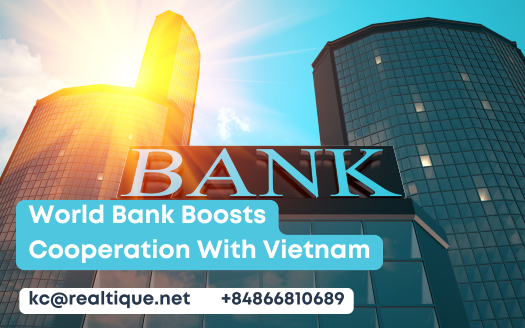World Bank Boosts Cooperation With Vietnam
The recent decision by the World Bank to enhance its cooperation with Vietnam marks a crucial moment in the country’s infrastructure development, with a particular emphasis on revolutionary projects such as the high-speed rail connecting Hanoi and Ho Chi Minh City. This initiative not only aims to strengthen economic resilience but also addresses pressing climate change concerns through sustainable practices. As Vietnam positions itself within global supply chains, the implications of this partnership extend beyond mere infrastructure improvements, hinting at a broader strategy for regional integration and economic change that merits further exploration.
Table of Contents
The World Bank’s cooperation with Vietnam is primarily aimed at enhancing the nation’s infrastructure, with a particular focus on developing strong transportation networks.
This initiative encompasses the expansion and improvement of highways, railways, and waterways, particularly within the Mekong region, which is essential for regional connectivity and economic growth.
By investing in infrastructure, the World Bank seeks to facilitate Vietnam’s integration into global supply chains, thereby contributing to the nation’s economic resilience.
Ajay Banga has emphasized Vietnam’s critical role in global poverty alleviation, highlighting the importance of strategic investment in infrastructure to combat socioeconomic challenges.
The partnership aims to adapt to significant global changes, ensuring that development strategies remain effective and responsive to the changing needs of Vietnam’s population.
Vietnam High-Speed Rail Project
Significant advancements are underway with the upcoming high-speed rail project in Vietnam, which aims to achieve speeds of up to 350 km/h.
This ambitious initiative will establish an essential transportation link between Hanoi (Ngọc Hội) and Ho Chi Minh City (Thủ Thiêm), significantly improving connectivity across more than 20 provinces and cities.
As part of broader infrastructure enhancement efforts, the project is expected to enhance transportation efficiency, reduce travel times, and encourage economic growth.
By modernizing the rail network, Vietnam aims to facilitate better movement of goods and people, thereby enhancing regional integration and supporting its economic evolution.
The collaboration with the World Bank will play an important role in securing the necessary funding and knowledge for this groundbreaking project.
Vietnam's Climate Change Initiatives
Building on the advancements in infrastructure, Vietnam is prioritizing climate change initiatives to promote sustainable development and address environmental challenges. The country is actively transitioning towards low-carbon energy sources, embracing carbon credit trading systems aimed at reducing greenhouse gas emissions.
This innovative approach has already seen approximately 10.3 million tons of CO2 sold to the World Bank, cultivating economic opportunities for farmers while encouraging sustainable practices. By adhering to stringent carbon credit evaluation processes, farmers can enhance their income while contributing to national climate goals.
Additionally, Vietnam is committed to enhancing disaster preparedness and resilience, ensuring that its developmental strategies are aligned with global sustainability objectives. These initiatives highlight Vietnam’s dedication to combating climate change and nurturing a greener future.
Vietnam's Economic Transformation Efforts
Amidst ongoing global economic shifts, Vietnam is actively pursuing an extensive economic alteration to enhance its integration into global supply chains. This alteration is characterized by strategic collaborations with the World Bank, focusing on sustainable infrastructure development and energy transition projects. Emphasizing resilience and adaptability to climate change, Vietnam aims to align its economic goals with global standards.
| Focus Area | Initiative | Expected Outcome |
|---|---|---|
| Infrastructure Development | High-speed rail project | Enhanced connectivity |
| Energy Transition | Low-carbon initiatives | Sustainable energy sources |
| Climate Resilience | Disaster preparedness | Reduced vulnerability |
These efforts reflect Vietnam’s commitment to sustainable development and economic diversification, positioning the nation as a key player in the global economy.
Vietnam & WB's Strategic Partnerships Ahead
Strategically, Vietnam consistently seeks to strengthen its partnerships with international organizations, particularly the World Bank, to advance its development agenda.
The World Bank is ready to prioritize significant funding for Vietnam’s infrastructure and renewable energy projects, essential for the nation’s economic change. Upcoming initiatives, such as the high-speed rail project linking Hanoi to Ho Chi Minh City, will enhance connectivity and encourage regional development.
Additionally, Vietnam’s commitment to a low-carbon energy transition aligns with the World Bank’s objectives, evidenced by recent carbon credit sales.
The rapid development of the Country Partnership Structure (CPS) highlights a mutual dedication to sustainable growth, with future collaborations aimed at reinforcing resilience against climate change and promoting inclusive development across various sectors.





